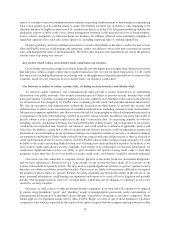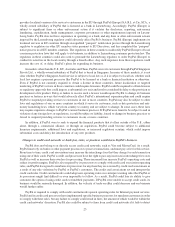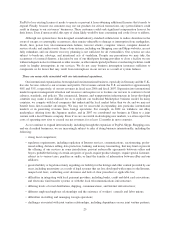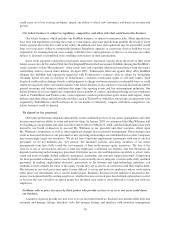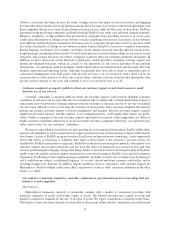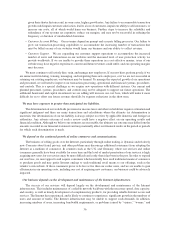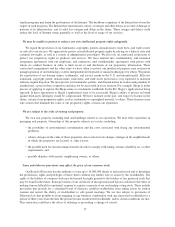eBay 2007 Annual Report Download - page 37
Download and view the complete annual report
Please find page 37 of the 2007 eBay annual report below. You can navigate through the pages in the report by either clicking on the pages listed below, or by using the keyword search tool below to find specific information within the annual report.these types of transactions. Any of these transactions could be material to our financial condition and results of
operations. The process of integrating any acquired business may create unforeseen operating difficulties and
expenditures and is itself risky. The areas where we may face difficulties include:
• diversion of management time, as well as a shift of focus from operating the businesses to issues related to
integration and administration, particularly given the large number and size and varying scope of our recent
acquisitions;
• declining employee morale and retention issues resulting from changes in, or acceleration of, compensation,
or changes in management, reporting relationships, future prospects, or the direction of the business;
• the need to integrate each company’s accounting, management, information, human resource and other
administrative systems to permit effective management, and the lack of control if such integration is delayed
or not implemented;
• the need to implement controls, procedures and policies appropriate for a larger public company at
companies that prior to acquisition had lacked such controls, procedures and policies;
• in the case of foreign acquisitions, the need to integrate operations across different cultures and languages
and to address the particular economic, currency, political, and regulatory risks associated with specific
countries;
• in some cases, the need to transition operations, users, and customers onto our existing platforms; and
• liability for activities of the acquired company before the acquisition, including violations of laws, rules and
regulations, commercial disputes, tax liabilities and other known and unknown liabilities.
Moreover, we may not realize the anticipated benefits of any or all of our acquisitions, or may not realize them
in the time frame expected. For example, in connection with the Skype transaction, we recorded a goodwill
impairment charge of approximately $1.4 billion in our financial statements during 2007. Future acquisitions or
mergers may result in a need to issue additional equity securities, spend our cash, or incur debt, liabilities,
amortization expenses related to intangible assets or write-offs of goodwill, any of which could reduce our
profitability and harm our business.
In addition, we have made investments in certain joint ventures in which we have a minority equity interest,
and lack management and operational control. These investments in joint ventures may involve risks, including the
risk that the controlling joint venture partner may have business interests, strategies or goals that are inconsistent
with ours, and the risk that business decisions or other actions or omissions of the controlling joint venture partner or
the joint venture company may result in harm to our reputation or adversely affect the value of our investment in the
joint venture.
Our business and users may be subject to sales tax and other taxes.
The application of indirect taxes (such as sales and use tax, value-added tax, or VAT, goods and services tax,
business tax, and gross receipt tax) to ecommerce businesses such as eBay and to our users is a complex and
evolving issue. Many of the fundamental statutes and regulations that impose these taxes were established before
the growth of the Internet and ecommerce. In many cases, it is not clear how existing statutes apply to the Internet or
electronic commerce or communications conducted over the Internet. In addition, some jurisdictions have
implemented or may implement laws specifically addressing the Internet or some aspect of electronic commerce
or communications on the Internet. From time to time, some taxing authorities have notified us that they believe we
owe them certain taxes. The application of existing or future laws could have adverse effects on our business.
Several proposals have been made at the U.S. state and local level that would impose additional taxes on the
sale of goods and services or communications through the Internet. These proposals, if adopted, could substantially
impair the growth of ecommerce and our brands, and could diminish our opportunity to derive financial benefit from
our activities. The U.S. federal government’s moratorium on state and local taxation of Internet access or multiple or
discriminatory taxes on ecommerce was extended through November 2014 through legislation enacted in October
2007. This moratorium does not prohibit federal, state, or local authorities from collecting taxes on our income or
27




